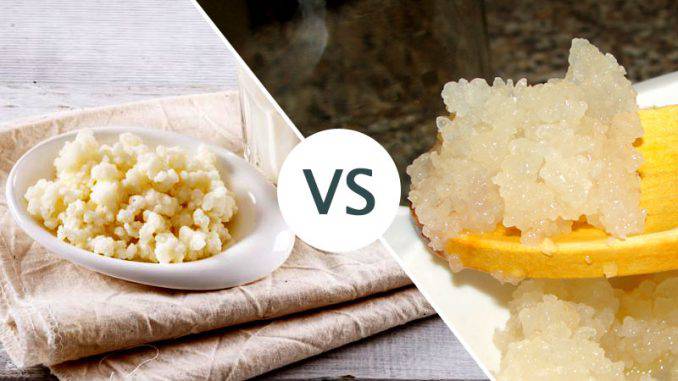
One of the most frequent questions our readers keep asking is, “which Kefir should we choose – milk or water”?
These two types of Kefir are very different from just any standpoint, and any direct comparison between them wouldn’t be sensible.
While Milk Kefir is made with cow, goat, or sheep milk and is similar to yogurt, Water Kefir is water-based, made with only sugar and plain water, and resembles a soda drink. A direct comparison between milk and water Kefir would be like comparing yogurt with cola. Not very sensible, right?
Still, it would be helpful to identify all differences between these two probiotic drinks to unambiguously decide which one would be the best fit for your specific probiotic needs.
At first glance, the most obvious difference is that milk Kefir is a dairy product and may not be suitable for vegans and lactose-intolerant people. However, milk Kefir grains can also thrive and ferment in non-dairy kinds of milk like soy milk, coconut milk, or almond milk, not containing lactose and making Kefir acceptable for vegans or lactose-intolerant people.
The differences between milk and water Kefir are, however, much more important than that. So, let’s dig deeper into the details.
Milk Kefir
Milk Kefir (also known as búlgaros) is a fermented dairy product known from ancient times and originating from the Caucasus, Central Asia, and Tibet. It is made through the inoculation (fermentation) of milk in the presence of a unique culture called Kefir grains.

Milk Kefir grains are creamy-white cauliflower-like formations consisting of colonies of bacteria and yeasts held together by a matrix of proteins, lipids, and sugars. They may contain up to 50 different species of probiotic bacteria, predominantly Lactic Acid Bacteria (LAB) from the Lactobacillus species. Kefir is also rich in vitamins, amino acids, and essential oils, which are proven to have a vast series of health benefits.
Milk Kefir is proven to be by far the most potent probiotic fermented dairy product. It improves digestion, acts as a powerful immune system modulator, has powerful antibacterial and anti-allergic properties, improves bone strength, fights osteoporosis, controls cholesterol levels and blood pressure, and even has anti-carcinogenic effects.
Milk Kefir has positive effects in preventing and treating a series of severe health conditions and diseases like SIBO (Small Intestinal Bacterial Overgrowth) and IBS (Irritable Bowel Syndrome). It also has a proven role in lowering the levels of blood pressure, cholesterol, and blood sugar.
Water Kefir
Water Kefir is a water-based fizzy drink obtained through the fermentation of sweetened water in the presence of Water Kefir grains. As we already said, although their names sound similar, water Kefir grains and milk Kefir grains have nothing in common.

The water Kefir grains (also known as Tibicos, Japanese crystals, or Japanese algae) are small, brownish, and gelatinous structures thought to originate from Mexico, where they thrived in the sweet waters of the Opuntia cactus.
Like the milk Kefir grains, the water Kefir grains are also a Symbiotic Colony Of Bacteria and Yeast (SCOBY). Still, unlike the milk Kefir grains, they contain more yeasts than bacteria and almost no Lactic Acid Bacteria (LAB).
The probiotic powers of water Kefir are considerably inferior to the ones of milk Kefir.
While it still has many health benefits, water Kefir is somewhat considered a healthy and tasty drink than a full-fledged probiotic food. Its main advantage over milk Kefir is that it is non-dairy, making it 100% vegan and lactose-free.
Actually, Water Kefir is not even Kefir but was misnamed for unclear reasons. The Tibicos that serve as a base for the fermentation of Water Kefir are, similarly to Milk Kefir grains, also a symbiotic culture, but are primarily populated by yeasts. Moreover, in the regions and countries where Milk Kefir originates from – the Caucasus, Russia, and Central Asia, the word Kefir designates for centuries only one product – Milk Kefir.
Alternatively, in the countries where Water Kefir is more widespread – Mexico, Central, and South America, they are usually called Tibicos, Tibi, Japanese water crystals, and even California bees, although they have nothing to do either with Japan or with bees. Anyway, in their “homelands” the Tibicos are almost never called Kefir.
Probiotic and nutritional differences
Milk Kefir is a considerably more potent probiotic than Water Kefir. Most varieties of milk Kefir usually contain up to 50 different probiotic bacteria and yeasts, while water Kefir is known to hold about 10 to no more than 15 probiotic strains.
Moreover, natural milk also provides milk Kefir with many vitamins, minerals, and other nutrients that cannot be found in water Kefir. These are protein, calcium, phosphorus, vitamin B12, riboflavin (vitamin B2), magnesium, vitamin D, and many more.
It is then evident that, as far as probiotic potency is concerned, water Kefir is far from being a full-featured alternative for milk Kefir, even if you are vegan or lactose-intolerant. Milk Kefir contains considerably less lactose than natural milk, making it much more acceptable by people affected by lactose intolerance.
Even the non-dairy option of milk Kefir made of coconut or almond milk still has considerably higher probiotic and nutritional values than water Kefir.
On the other hand, if you’re still looking for a 100% vegan, low-fat and low-calorie probiotic drink, water Kefir seems to be a better fit than milk Kefir.
Taste differences
Tastes of water Kefir and milk Kefir are also entirely different. While milk kefir tastes like diluted yogurt, water kefir “looks and feels” like a fizzy soda drink.
Moreover, water Kefir may contain more alcohol. While even the well-fermented milk Kefir typically contains no more than 0.7% of alcohol, the alcohol content of water Kefir can go up to 2% or more. That’s almost the alcoholic content of a beer!
Flavoring possibilities and byproducts
One of the most prominent advantages of milk Kefir is its possibility to serve as a base for an endless number of byproducts.
While the options to diversify the “look and feel” of water Kefir end up with many flavors that we could add at the secondary fermentation, the possibilities to diversify the milk kefir products are endless.
Milk Kefir can serve as a base for making kefir smoothies, kefir cheese, kefir icecreams, kefir cupcakes, kefir cheesecakes, and many more.
Another valuable byproduct of milk Kefir is also the whey obtained when straining the product when making Kefir cheese. This whey can be used either as a low-fat and low-calory probiotic drink or, instead of water, for making tasty sourdough bread.
Additionally, we can use milk Kefir for cosmetic purposes by making healthy and probiotic skin lotions and hair masks.
As conclusion:
Although both milk and water Kefirs are potent probiotics, milk Kefir has more probiotics, nutritional, and general health advantages than water Kefir. Water Kefir may have some advantages over milk Kefir only in case you are looking for a 100% vegan and lactose-free probiotic drink.



